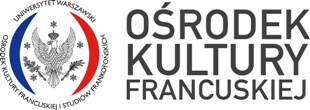Le mardi géopolitique du 8/03/2022 – prof. Anne-Marie D’Aoust & prof. Olivier Barsalou

Le Centre de civilisation française et d’études francophones, la Faculté de sciences politiques et d’études internationales de l’Université de Varsovie, l’Association polonaise d’études internationales et le Groupe d’études géopolitiques vous invitent à la rencontre dans le cadre du séminaire MARDIS GÉOPOLITIQUES.
Women, Gender, and Security in International Relations and International Law: From ‘Women’s Issues’ to Rethinking the Gendered Public/Private Divide
prof. Anne-Marie D’Aoust & prof. Olivier Barsalou (Université du Québec à Montréal)
le mardi 8/03/2022
15h00-16h30
ÉVÉNEMENT HYBRIDE
Salle 210, 69 rue Nowy Świat
On-line : https://us02web.zoom.us/j/88243195111
La rencontre se tiendra en anglais.
Veuillez noter que la réunion est enregistrée. L’enregistrement sera utilisé à des fins scientifiques. La participation à la rencontre équivaut à donner son consentement.
Veuillez respecter les règles du régime sanitaire en vigueur à l’Université de Varsovie.
Nous vous invitons à consulter l’article « Femmes, genre et sécurité en Relations internationales et en Droit international: un dialogue en construction » (en français): https://www.academia.edu/26660871/Femmes_genre_et_sécurité_en_relations_internationales_et_en_droit_international_un_dialogue_en_construction
Abstract
This presentation aims to explain how the dominant and traditional conception of power and political agency in International Relations does not account for the reality of women and their active contribution to political and economic life. We will detail how, beyond the presence of women themselves, the lack of attention to gender as a central analytical category in international life obscures the social co-constitution of gender roles and identities, as well as their impact in, and structuring of, international relations and international law. To do so, we focus three distinct components: securitization, embodiment and the control and regulation of bodies in the name of security. Without being exhaustive, the illustrative examples we will mobilize will tackle concretely three questions that are transversal to the two disciplines of International Relations and International Law:
Which subjects become “legitimate” objects of study for security in the international arena?
How are masculinity and femininity related to our understanding of violence and security?
How does a feminist questioning of the private/public divide in International Relations and International Law lead to new understandings of security issues?
Bios
ANNE-MARIE D’AOUST is an Associate professor in the Department of Political Science at the Université du Québec à Montréal (UQAM), Canada. Situated at the crossroads of critical security studies, law and society scholarship, international political sociology, and feminist and gender studies, her main research projects center on the connections between emotions, bodies, governmentality, and security. Empirically, she investigates the development of a moral economy of trust and suspicion transnational family reunification processes management. Theoretically, she aims to explore how emotions such as love function as a technology of government. She recently published in 2022 the edited volume Transnational Marriage and Partner Migration: Constellations of Security, Citizenship, and Rights, at Rutgers University Press. Her work has been featured in various journals, including Champ pénal/Penal Field, International Political Sociology, and Society and Space.
OLIVIER BARSALOU is an Assistant Professor in the Law Department at the Université du Québec à Montréal (UQAM). Situated at the intersection of international law, legal history, law and society as well as law and the humanities scholarships, his initial published works examined, from the perspective of the United States government archives, the emergence of the global human rights regimes in the post-1945 world. His current research project, however, slightly departs from his previous research to center on the role of international law in the advent of the global environmental crisis. He recently published in the Journal of the History of International Law (forthcoming, 2022), Chinese Journal of International Law (2018), the Journal of Conflict & Security Law (2018) as well as chapters in edited collections published by Edward Elgar (2021) Oxford University Press (2019) and Cambridge University Press (2018, 2015).
Together, they teach on a regular basis a graduate seminar. In their collaborative research, they aim to reflect on the ways in which the public/private divide is being deployed as a central risk management strategy for various states. They are currently working on a manuscript documenting how “private” relations and issues have led to the creation of major international legal milestones that contribute to the structuring of the international order.
